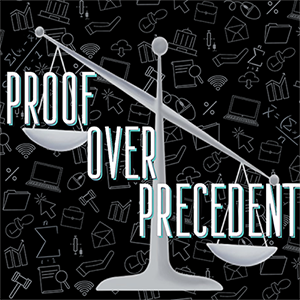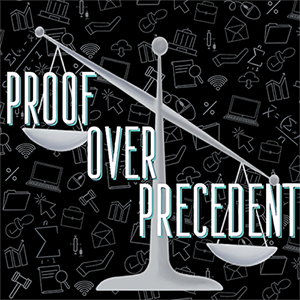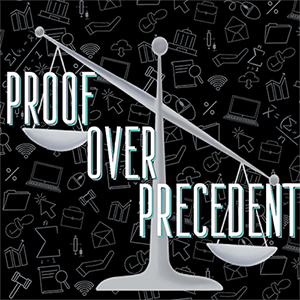Episode Transcript
[00:00:00] Speaker A: Imagine a justice system built on rigorous evidence, not gut instincts or educated guesses about what works and what doesn't.
More people could access the civil justice they deserve.
The criminal justice system could be smaller, more effective, and more humane.
The Access to Justice Lab here at Harvard Law School is producing that needed evidence. And this podcast is about the challenge of transforming law into an evidence based field.
I'm your host, Jim Griner, and this is proof Over Precedent.
This week we're bringing you a student voice.
[00:00:37] Speaker B: Hello, everyone, My name is Joe Lieberman and I'm a 2L at Harvard Law School. And I am joined today by Andrew Reed, who will be talking to us today about the important topic of the intersection of access to justice and courthouse cell phone bans. Welcome, Andrew.
[00:00:56] Speaker C: Thanks, Joe.
[00:00:58] Speaker B: So just to start with, when we say a courthouse cell phone ban, what does that mean? Does that just mean people can't text in the courtroom?
[00:01:08] Speaker C: Yeah, good question. I wish that is what it meant, but it actually means something much larger than that, which is that people can't even bring their cell phones into the courthouse.
These bans on cell phones are bans on the possession of cell phones in courthouses, not just the use of cell phones, and not just the use of cell phones to text or to take pictures or anything like that. And this is probably going to be kind of a theme throughout this podcast. But one thing that I do want to start with is to just say that policies that make accessing courts impractical have a real impact on the ability of people to access justice.
And courtroom cell phone bans are one of those things.
[00:01:58] Speaker D: Unfortunately, they're super common. There are currently many states that have courthouse cell phone bans. In some states, it varies based on the jurisdiction. So let's say in California, the Northern District will have a cell phone ban, while the Southern District does doesn't. But other states have statewide bans. So for instance, Massachusetts had a statewide.
[00:02:22] Speaker C: Ban for many years starting in the mid 2010s, and it only was rescinded just a few years ago, I think, in 2021. So this is a real problem.
[00:02:36] Speaker B: Okay, so I'm curious though. I mean, to, to me, I'm just coming to this issue now.
It seems kind of reasonable that we wouldn't allow people to be on their phones in courthouses. I mean, we kind of all know how distracting cell phones can be to everybody. Maybe I'm naive. What's the big deal?
[00:02:57] Speaker C: No, I think that your intuition is shared by a lot of people. And I also think that your intuition is shared by the people who are responsible for imposing these courthouse cell phone bans. You know, to some extent, you're in a courthouse, it's a very serious place.
People can sometimes abuse the privilege of having a phone by using it in.
[00:03:24] Speaker D: A way that's disruptive, which, especially in the context of a courthouse, is something that I think there are justifiable reasons.
[00:03:33] Speaker C: If you could just imagine something for me for a second.
[00:03:36] Speaker B: Yeah.
[00:03:37] Speaker C: What would you think if you couldn't bring your cell phone into the mall or couldn't bring your cell phone to a baseball game?
Would that make any difference to you with respect to whether or not you would go to the mall or go to a Red Sox game?
[00:03:54] Speaker B: That's a great point. I love baseball, but it would be hard to be away from my phone for, you know, three hours. That I don't think I'm like a, you know, a phone addict or anything like that. But I'm always thinking about, what if somebody I. I know gets hurt or needs to reach out to me, or maybe I have some. Some clinical work for school and a client needs something.
I. I'd hate to be away from my phone for that long, But I guess.
And I'll be curious to hear what you have to say about this, because the thought that I have is almost, yeah, a baseball game is one thing, but, you know, a courthouse.
Don't people know that they have this ban? And I feel like, you know, a court date is a, you know, pretty serious occasion. Are. Are they. Are they surprised about this? You know, why is this a problem if they know it ahead of time and they sort of legally have to be there?
[00:04:40] Speaker C: Yeah, that's a fair point. There's at least a couple of things to be said about that question. For one, a lot of people don't know about these cell phone bans. And so what'll happen is they'll arrive at the courthouse on the day of their.
Let's use a really serious example, like a child custody hearing. They'll arrive at the courthouse on the day of the hearing. They'll arrive 15 or 20 minutes before the hearing, and they'll walk up and they'll see a sign that says no cell phones in the courthouse or something to that effect. And that often will be the first time that they ever hear about the courthouse cell phone ban.
[00:05:20] Speaker D: And so what happens in those circumstances is one of a few things.
If the person drove to the courthouse, meaning they are at least wealthy enough to own a car, and they feel comfortable leaving their phone in the car, then they can do that if the person didn't drive to the courthouse and there's no other place for them to.
[00:05:41] Speaker C: Leave their phone with a trusted person. Or as we'll talk about a little bit later, some courthouses have lockers for cell phones. They then they're in a real bind because they can't enter the courthouse with their cell phone, and they also have nowhere to put it. And so what we've seen is people putting their cell phones in bushes outside of courthouses.
There's one fun anecdote in the blog post that accompanies this podcast about people burying their cell phones in the ground because they felt that someone would steal the phone out of the bush, which is a real thing that's been happening. I talk about an anecdote of a woman who had a hearing to go to, and she left her cell phone out in the bushes because she had nowhere else to put it. And she came back and someone had stolen the cell phone. And there are even reports of sort of bands of thieves understanding that people will come to the courthouse with their cell phone, not knowing that there's a ban, and leave their cell phone outside because they have no other place to put it. And the thieves just swoop in and steal their cell phones.
[00:06:57] Speaker D: Another wild thing that happened in Massachusetts, actually, as a result of courthouse cell phone bans was there was a cottage industry of sorts that sprung up among people who would sit in in their cars outside of the courthouse and charge people to babysit their cell phone for the day.
[00:07:20] Speaker C: And so basically, you would go and you would give them $10 or whatever, and they would take your cell phone and you would go in and have your hearing. And then hopefully when you come out, you get your cell phone back.
[00:07:31] Speaker D: But all of the outcomes I just described involve the individual actually making it to their court hearing.
But many people aren't willing to relinquish their cell phone to a stranger or put their cell phone in a bush or store it in a locker because they have to be on their phone all day if they have a sick parent or a sick child or some kind of work obligation.
And so many people, when they see that there is a courthouse cell phone ban, they'll just go home and they'll miss their hearing. And it turns out that is the most likely outcome of all.
[00:08:09] Speaker B: That sounds pretty crazy. So, like, why are courts doing this?
[00:08:14] Speaker C: So the first is just maintain order in the courtroom.
You don't want people bringing their cell phones into a courtroom where a witness is being examined or advocates are arguing over A motion because. Because that person's phone might start ringing. And so the goal is just kind of to maintain order in that sense. And then the other is a security concern.
Another problem that the cell phone bans are intended to prevent is the unauthorized recording of court proceedings. Now, by and large, courtroom proceedings are public. You or I could walk into a courthouse on a Tuesday and go up to one of the courtrooms and take a seat in the gallery, and we're welcome to sit there and watch attorneys argue over a motion on a case that you or I have nothing to do with. Right. It's just open to the public.
[00:09:11] Speaker B: So it feels like there should be a middle ground, doesn't it? I mean, we've got either cell phones going off in the courtroom or the marauding bands of cell phone thieves that you described. I mean, I think I heard you mention lockers or something earlier on. Is that something that places are doing? I mean, what are the solutions here?
[00:09:29] Speaker C: Yeah, that's a good point. So you're right. There are a couple of solutions that can satisfy both the interests of the courts and the interests of the individuals who wish to bring their cell phones into the courthouse. You just hit on one of them. One of them is lockers.
Um, so I don't know if you've ever been to a place where they have them, like amusement parks and stuff like that, where if you want to leave your stuff, whether it's flip flops or your wallet, you can rent a locker for a $2, you get a little lock, and then at the end of your visit, you come back and collect your things.
That's one option. Another option, and this is something that has sprung up in the last several years, is, is pouches. Security pouches. I've never been to a comedy show where they had these, but at comedy shows and at some concerts nowadays, they don't allow recording.
And so what they'll do, because there's not enough lockers to. To be able to keep everyone's cell phone.
[00:10:38] Speaker D: And also, people tend not to want to put their phone in a locker. They like the security of having their phone on them at all times, even if they can't use it.
[00:10:47] Speaker C: Some venues have started using security pouches, which basically is just a thick bag that when you arrive at the venue, you put your phone inside, and then someone on the venue staff will lock the bag.
And so now you're walking around with your phone in a bag. So you still have your phone on you, but you're not able to use it because the bag itself is locked.
But if you ever need to use your phone, you can go to one of the secure areas of the venue and they'll have a kiosk or a worker there who will unlock the bag for you, allow you to use your phone. And then when you need to leave that area to go back to the show, the phone goes back in the bag, it gets re locked and you're free to go with your phone. We could do something similar in courthouses. And in fact, I think some courthouses have already tried to do this, where you show up at the courthouse, they have pouches there, you put your phone in the pouch, they lock the pouch, you can go into the courtroom.
And then when you're not in the courtroom, when you're in a specific area in the courthouse where it's okay to use your phone, the pouch can be unlocked by a staff member and you can use your phone. Now, this has really important consequences for a lot of people in their lives because if you go to the courthouse for a child custody hearing, let's say it might last six hours, maybe the hearing doesn't last for six hours, but maybe you have to wait two hours and then wait some more. Going to the courthouse can be a waiting game a lot of times.
So if you're in a position like that where you can't have your phone on you, or you can't have ready access to your phone, if you have little kids at home who are banking on their ability to be able to call you in an emergency, if you have a job that requires you to be at least near your phone at all times in case something comes up at work, you're kind of out of luck. And so those are intended to solve those problems and they do reasonably well at that all. Although there haven't been so far particularly good quantitative studies on those issues and how these various solutions might impact things like failure to appear rates and things of that nature.
[00:13:17] Speaker B: I was going to ask about that. Yes, I'm glad you started going there. Are there certain studies that you think, you know, we need to do in order to figure out the path forward here, or is it as simple as this anecdotal intuition that if you can't bring your phone, it's harder for people to go to court, and that's not a good thing.
[00:13:36] Speaker C: Probably the most encouraging thing about this topic is that it is something that can be studied in a rigorous empirical way. There are a lot of states who currently have courthouse cell phone bans, and there are a lot of states where Some districts have courthouse cell phone bans and some districts don't.
And so what we could do is construct a randomized control trial, take a state. Let's say it's California, and let's assume California has a universal courthouse cell phone ban. Right. You could take California and split it in two and say, okay, half of the judicial districts in California will keep that ban, and half of the judicial districts in California are going to remove the ban. You could split it up differently too, Right. You could say one quarter are going to keep the ban, one quarter are going to do lockers, one quarter pouches, and then one quarter just. It's sort of a free for all. Anyone can bring their cell phone in. Now if something like that happened, we could study the differences in things like failure to appear rates, outcomes in small claims court, where it's really important that a person be able to bring their cell phone in for reasons having nothing to do with their personal life, but real tangible reasons related to the law and the case at hand. Right. Because if you're in small claims court, one of the ways in which you might try to prove your particular claim is by showing the judge, let's say, text messages or emails on your cell phone. Sure. You can say, oh, well, they can just print them off. Well, it's an impractical thing for a lot of people. A lot of people don't have easy access to printers. And so these types of trials would allow us to measure not only the effects that courthouse cell phone bans have on litigants themselves, but also outcomes in the legal system.
[00:15:40] Speaker B: Yeah, that's. That's really important. Andrew, thanks for, for walking us through that, and I'll be, you know, excited to see if we get any of those studies out there on this issue. Really appreciate, appreciate you taking the time with us today. Anything you want to leave us with.
[00:15:55] Speaker C: Thanks for the conversation, Joe. I appreciate it. And yeah, this is a really important issue. It's something that a lot of people aren't thinking about, quite honestly, but it's something that has a big impact on the lives of the people who need access to justice. And, and hopefully we'll be able to get some better data in the future and then using that data, come up with some good solutions.
[00:16:18] Speaker A: Proof Over Precedent is a production of the Access to Justice Lab at Harvard Law School.
Views expressed in student podcasts are not necessarily those of the A J Lab.
Thanks for listening. If we piqued your interest, please subscribe wherever you get your podcasts. Even better, leave us a rating or share an episode with a friend or on social media.
Here's a sneak preview of what we'll bring you next week.
[00:16:44] Speaker E: This has been a huge argument among social behavioral researchers where, you know, tell me why this requires IRB oversight, especially with ethnographers.
[00:16:59] Speaker C: Right?
[00:16:59] Speaker E: Because they're describing a culture or, you know, situation, etc. And it's not necessarily following scientific method per se. And so this has been a real challenge for social behavioral IRBs is, well, what criteria are you using to determine whether something needs IRB oversight or not?
 Image by Courtney Chrystal, J.D. candidate, Harvard Law School
Image by Courtney Chrystal, J.D. candidate, Harvard Law School


